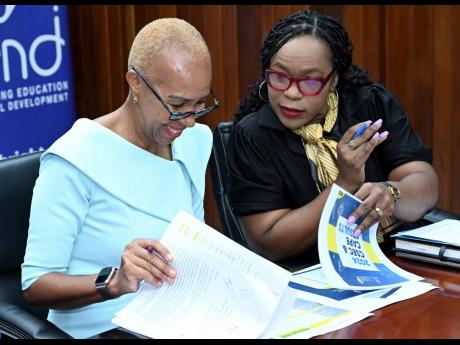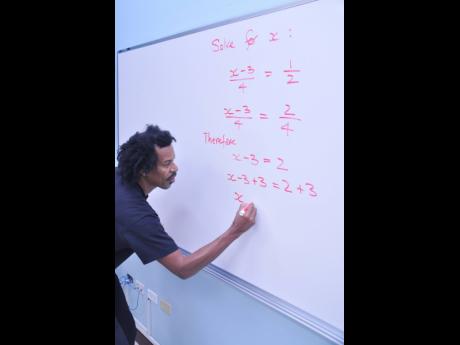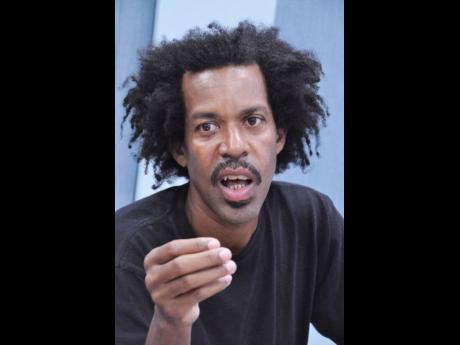Expert suggests returning to Three Rs to fix CSEC maths crisis
6,000 Jamaican students fail to pass a single subject
Mathematics expert Dr Samuel McDaniel has asserted that a complete overhaul of primary education is necessary to address the consistently mediocre performance of students in the subject area at the Caribbean Secondary Education Certificate (CSEC) level.
In fact, the lecturer in the Department of Mathematics at The University of the West Indies, Mona, posits that only three subjects should be taught in primary schools: reading, writing, and arithmetic.
“When a child leaves primary school, they should be able to read and read fluently and understand what they are reading … . If you cannot read properly, then it is almost impossible to do math,” he told The Gleaner on Monday.
McDaniel’s comments followed the disclosure by Education Minister Fayval Williams that only 18 per cent of Jamaican students who sat the May-June CSEC exams received five or more subjects, inclusive of mathematics and English A (language) – a three percentage point decrease when compared to last year’s results.
Further, there were decreases in the percentage of students who achieved passing grades in the CSEC mathematics and English A exams, when compared with 2023.
Speaking at a press conference on Monday, Williams revealed that just 33 per cent of Jamaican candidates obtained passing grades in mathematics, while 74 per cent passed English A. The figures decreased by eight and two percentage points, respectively, when compared with 2023.
The students’ performances in these two core subject areas were also below the regional averages recorded this year.
Thirty-six per cent of students across the Caribbean received passing grades for mathematics, a seven percentage point decrease when compared with 2023, while 76 per cent of students received grades one to three in English A, a two percentage point decrease.
“Obviously, at that level, we are not satisfied with the performance of our students in their maths exams, and so we here at the Ministry of Education and Youth, we have to redouble our efforts, we have to have an emergency plan for maths to help students,” Williams said.
Any such plan, McDaniel asserted, should include the long-term goal of reducing the number of subjects students do at the primary level.
“But I am not too sure if we are brave enough or we have the political will to do it because people think that fewer is worse, but [what obtains currently] is not necessarily better because the kids are leaving primary school and they are just not competent in reading,” he said.
Data from the 2021 Patterson Report, which reviewed Jamaica’s education system, revealed that 59 per cent of students who had completed primary school in 2019 were failing mathematics, while 45 per cent were failing language arts.
This reality, McDaniel argued, has a direct correlation with students’ performance in external examinations.
“The critical link to mathematics is the ability to read and to understand, because if you cannot read, you cannot understand, and if you don’t understand a particular (maths) problem, you cannot [solve] the problem,” he said.
But admitting that a lot of work needs to be done, Williams said efforts are under way to get more mathematics teachers in the education system.
“We know that currently, we are encouraging people to go to our teachers’ educational institutions to focus on the STEM (science, engineering, technology, and mathematics) subjects,” she said.
BRIDGING THE GAP
She also pointed to the $2.5-billion scholarship programme launched by the Ministry of Finance, in partnership with the Students’ Loan Bureau and the Mico University College, which will benefit students matriculating into STEM areas.
Meanwhile, acting Chief Education Officer Terry-Ann Thomas Gayle said the ministry will be giving more “hands-on guidance” to teachers at the primary and secondary levels to bridge the gap between teaching and performance.
At the primary level, Thomas Gayle said a specialist model will be introduced to ensure that teachers are covering specific subject areas, including mathematics, language arts, the sciences, and social studies.
In the meantime, Williams noted that some 33,235 students from public schools were registered for the CSEC exams, of which 31,660 sat, and 26,934 of them passed at least one subject.
She shared that the Caribbean Advanced Proficiency Examination had some 43,661 students sitting exams. Unit One had 31,1783 subject entries, with 30,136 students sitting exams, achieving a pass rate of 90 per cent.
Of the 14,111 subject entries for Unit Two, 13,525 did the exams, with a pass rate of 91 per cent.
“When compared to Unit One 2023, there were improvements in 13 subjects, and 16 subjects in Unit Two. The analysis shows that in Unit One, 17 subject areas recorded passes of 90 per cent and over, whereas Unit Two recorded passes of 95 per cent and above in 15 subjects and six subjects scoring 100 per cent,” the education minister said.



